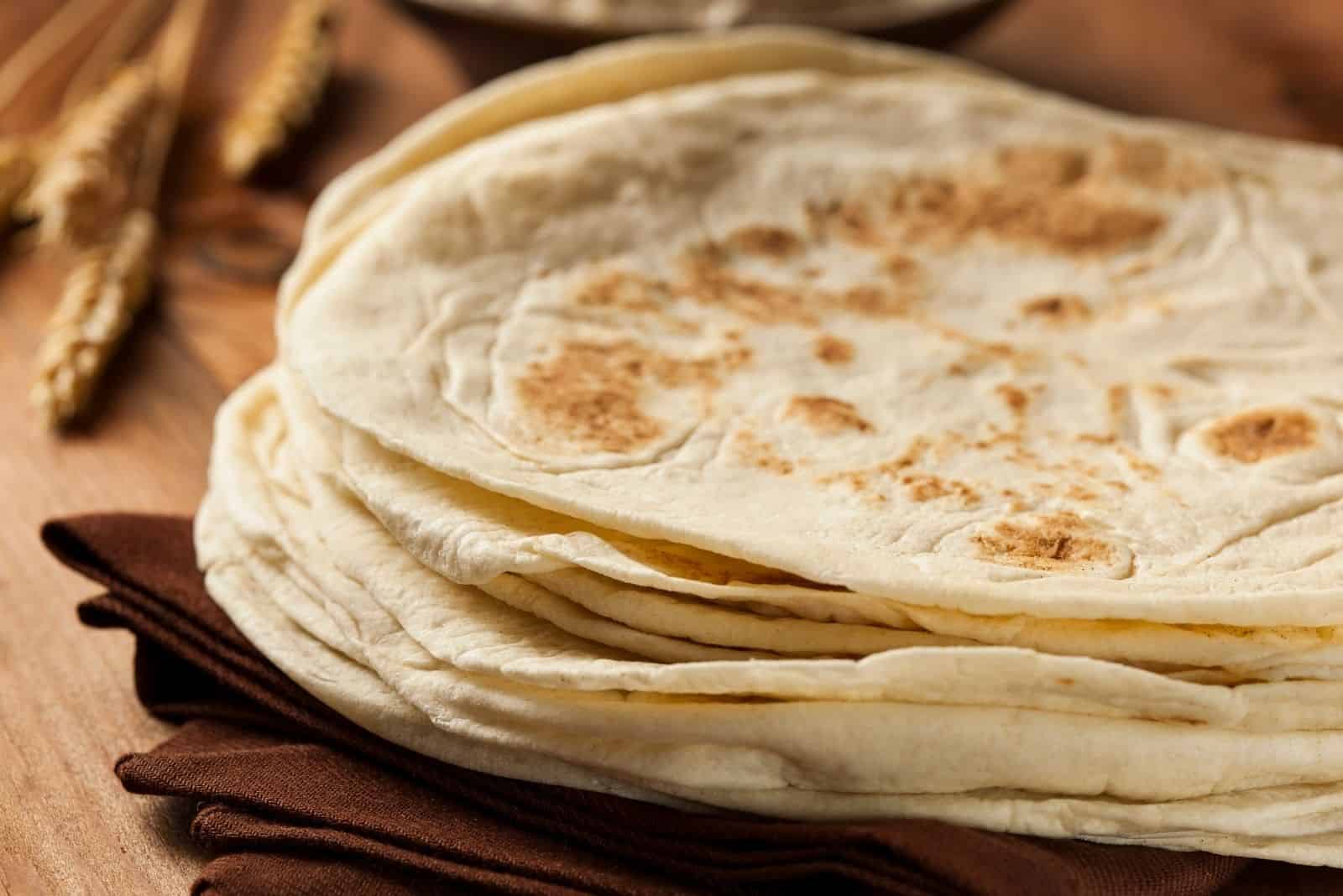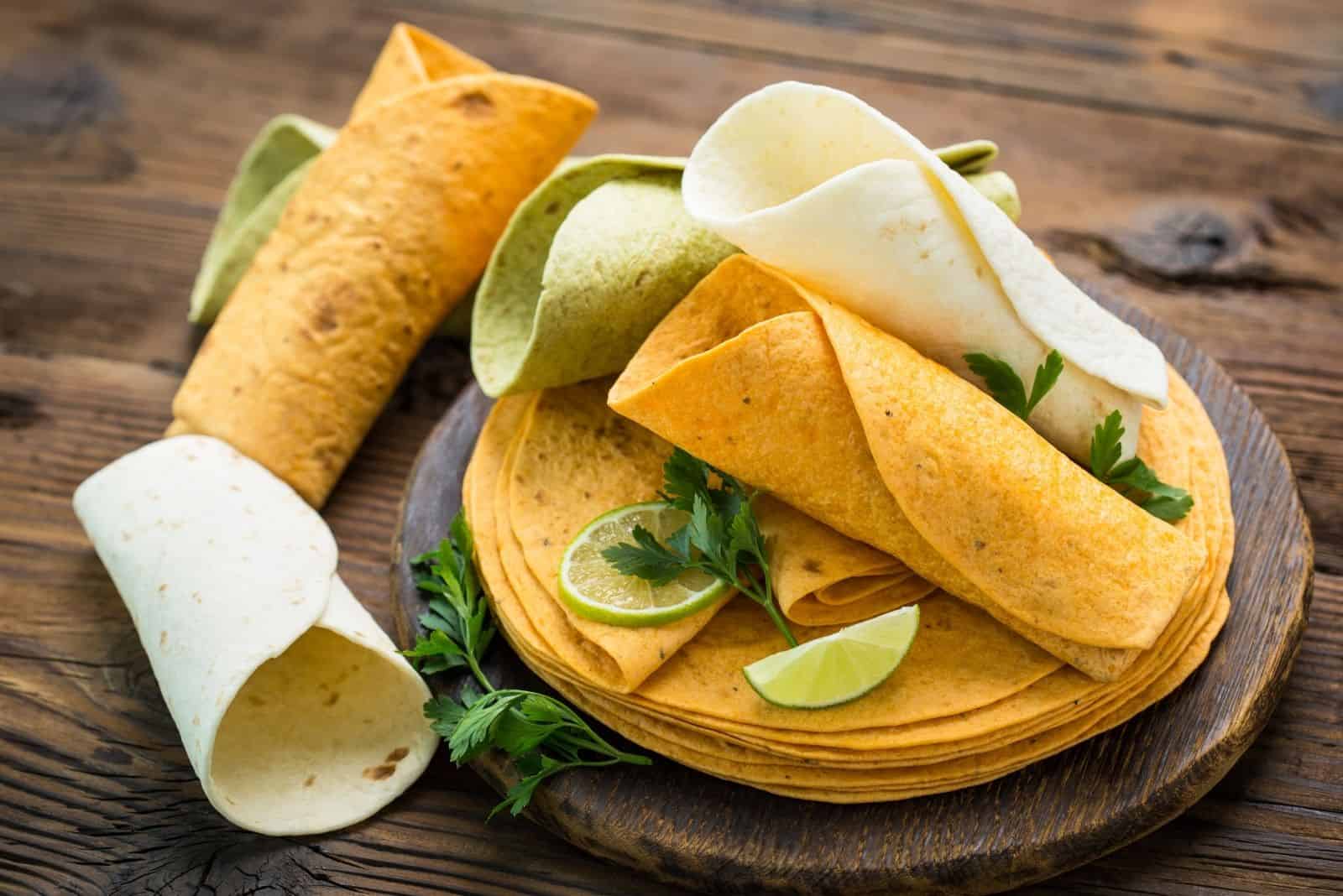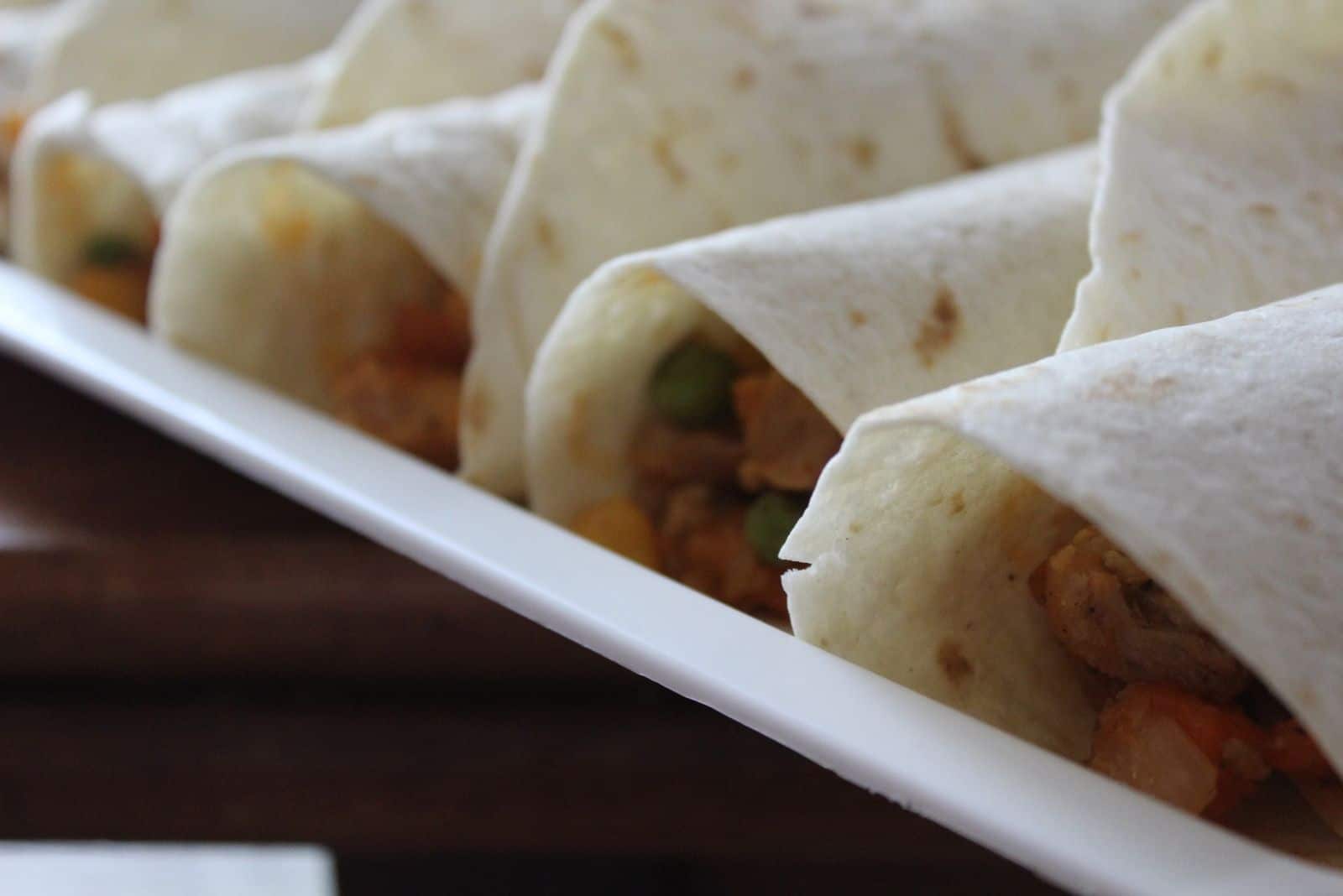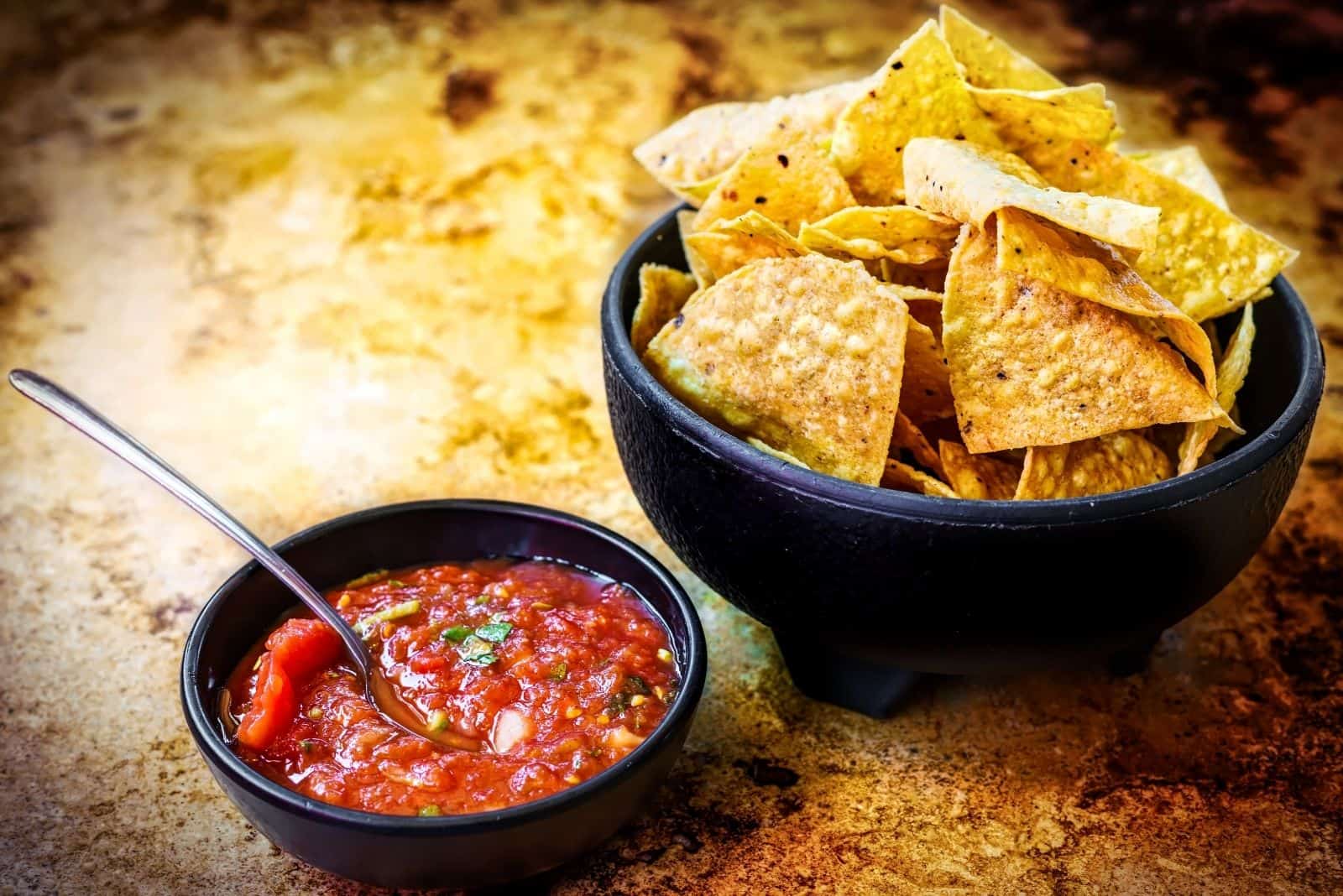We all care about our fur babies and want the best for them. We like to give them treats but need to know if they are safe, and that’s why you’re reading this right now!
That’s okay, as it shows that you care.
Veterinary clinics deal with thousands of dogs each year that get sick from eating human food, as many people don’t realize the hidden dangers to dogs.
This article focuses on one of those foods that we might take for granted as being safe for dogs: the tortilla wrap. After all, we eat them, so why can’t dogs? Can dogs eat tortillas?
Well, we’re about to find out!
So, Can Dogs Eat Tortillas?

Technically, yes, dogs can eat tortillas. But, as you probably already guessed, there’s more to it. The honest answer is: dogs should avoid eating tortillas for several reasons.
First, let’s be clear about what a tortilla is, so we know that we’re talking about the same thing:
Tortillas are circular unleavened flatbreads widely used in Mexican (or Mesoamerican) food, made from maize or wheat flour. Fillings are usually added to these wraps, creating a variety of delicious Mexican dishes, like burritos, tacos, enchiladas, and fajitas.
In Spanish cuisine, a tortilla is an omelet! However, we’re going with the Mexican flatbread here. Anyone hungry yet?
Hidden Dangers
You could be creating a Mexican culinary masterpiece in your kitchen, and your dog is hovering expectantly close by.
Or, maybe you’re settled on your sofa watching TV, with a plate of mouth watering Mexican food on your knee. Over to one side, you see your pooch drooling, waiting for you to toss a morsel in its direction.
In either scenario, it’s easy to give in, tear a piece of tortilla off and pitch it into those salivating jaws.
But is this wise? Will it harm them?
In all probability, one small piece won’t do any harm.
Even so, there are health risks that you need to be aware of, and it’s all to do with the ingredients, the cooking method, and any fillings you choose.
Let’s take a look inside the different types of tortillas to see what’s there and how it can affect your dog.
Flour Tortillas
Store-bought flour tortillas look simple enough and taste great when packed with a tasty filling. However, take a look at the typical ingredients list:
• Wheat flour
• Vitamins B1, B2, and B9
• Water
• Shortening (a vegetable or animal fat of some kind)
• Baking powder
• Wheat starch
• Salt
• Sugar
• enzymes to boost shelf life (amylase or xylanase)
• Calcium carbonate
• Antioxidants
• Cellulose gum
• Guar gum
• Calcium propionate and sorbic acid (preservative)
Remember, this is only a general idea; some brands will miss ingredients out or add extra ones.
While some of these ingredients are fine, others need more scrutiny.
Surprisingly, the worst one for dogs may be wheat flour! Many dogs have wheat allergies or are gluten intolerant. You’ll soon know if this is the case, as your dog will display symptoms like vomiting, diarrhea, skin irritations, and ear infections.
Gluten intolerant dogs are usually placed on a wheat-free diet to avoid those nasty side effects. If you suspect your dog is affected, speak to your vet as they may be able to run tests to confirm it or rule it out.
Further down the list, we find shortening. This is any fat that’s solid at room temperature, often used to make crumbly pastry. Animal fat (lard) was traditionally used, though palm oil and soybean oil are more common these days.
Some of these are hydrogenated oils, which is bad news for humans as well as dogs! Hydrogenated oils are high in trans-fats that are seriously bad for the heart.
Wheat starch is another one to watch out for. Dogs can’t handle too much starch in their diet as it leads to insulin resistance and obesity.
We don’t need to explain about salt and sugar; everyone knows that these are bad for you in excess.
Even so, it’s essential to be aware of sodium ion poisoning (salt poisoning), which is a serious issue for dogs. If the salt levels get too high, your dog will experience tremors and seizures and can even fall into a coma due to dehydration.
At this stage, it’s a pretty safe bet that your dog won’t wake up again. Always try to avoid giving your dog salty foods, and make sure they always have access to fresh water.
Excessive amounts of calcium carbonate can stop your dog from absorbing essential minerals, so this is another risk to watch out for.
Guar gum is a tricky one: although generally considered safe and found in many processed foods, some sources claim that this emulsifier causes problems with a dog’s digestive system. It’s also been linked to insulin resistance, weight gain, and increased appetite.
Finally, calcium propionate (another preservative) has been known to give dogs an upset stomach and heart problems.
It’s fair to say that the ingredients that might cause problems (with the exception of wheat flour) are all in such small quantities that they probably wouldn’t affect your pooch. However, this only applies if you feed them to your dog very occasionally.
Our question is, can dogs eat tortillas? Although, perhaps this should be, are tortillas bad for dogs? And at the moment, the answer seems to be a resounding yes.
This is especially so if your dog already has health problems, including blood sugar complications like diabetes or health issues connected with their heart and kidneys.
Corn Tortillas

Store-bought corn tortillas are much the same, in terms of ingredients, with the obvious difference being that they are made from corn (maize) flour instead of wheat.
Traditionally, they are made using hominy, which is corn (maize) kernels that have gone through a process called nixtamalization. This chemical process involves soaking the grains in a lye (or slaked lime) solution to remove the hull and stop it from sprouting when stored.
Don’t panic! Although it sounds a bit strange, this makes more of the grain usable and increases its nutritional value.
Corn tortillas are better for dogs with wheat allergies, but you should still check the ingredients carefully.
Spinach Tortillas
These are a good compromise, especially if homemade. The addition of spinach boosts their nutritional value significantly.
Even so, you should still limit how many you give your puppy!
One fact to keep in mind is that all forms of tortilla wrap are packed with carbs and calories: a single 12-inch flour tortilla can contain as many as 300 calories. And as for carbohydrates, one wrap can have between 30g and 50g.
This is not good news for our canine friends.
Whole Grain Tortillas
These are an even healthier version of this versatile wrap, and they are safe for dogs that aren’t allergic to wheat or have a gluten intolerance.
However (surely you knew that was coming?), it’s still not good to let them eat too much. These wraps are high in fiber, which can trigger diarrhea in dogs with sensitive stomachs.
Baked Vs. Fried Tortillas
Baked foods are always considered healthier than fried, which is even more critical when dogs are involved.
In fact, dogs should never be given fried foods.
Too much fatty and fried food will result in pancreatitis, which can be fatal. Vets often euthanize dogs with acute pancreatitis as there is nothing they can do to save them.
Symptoms include lethargy, vomiting, diarrhea, dehydration, and abdominal pain. Although most cases are mild, it’s never pleasant to see your best friend suffer.
Dog owners who boast about feeding their furry pal crispy bacon should take heed: it may not happen straight away, but each piece of fried food is storing up trouble for the future.
Homemade Tortillas
As with most ancient foods, tortillas are pretty easy to make at home, and the ingredients are very basic: flour, water, baking powder, shortening, and salt.
Some people leave out the salt or baking powder, and there are many variations on the recipe.
If you make these at home, you control what goes in the mix, so you know there are no hidden nasties! These are safer for your dog, with the corn flour version being better, especially in cases of gluten intolerance.
Even so, they don’t have a lot of nutritional value, so they should never form a large part of your dog’s diet.
Here’s a word of caution though: if you do decide to make your own, with the intention of allowing your furry pal to enjoy a few pieces, don’t add garlic or onion powder into the mix. Despite claims otherwise, onion and garlic (and any member of the same family) are toxic to dogs.
At best, your dog will get an upset stomach. At worst, they’ll get hemolytic anemia, where the red blood vessels burst. An affected dog will die if not treated immediately.
What About The Fillings?

It gets really interesting here, as these wraps can be filled with an amazing variety of appetizing foods!
Sadly, many of them will harm our furry companions.
Here are some things to avoid:
• Onion (these are highly toxic to dogs, whether raw, cooked, or powdered. Onions contain N-propyl disulfide, which attacks red blood cells, causing anemia. Dogs should never be fed any member of the onion family in any form.
• Garlic (see above)
• Tomato (contain a toxin called tomatine, though ripened tomatoes are okay in small amounts)
• Too much salt (because of dehydration and salt poisoning)
• Hot chili peppers (dogs can react badly to hot spices, usually resulting in loose stools)
• Chili powder (because of the hot spice thing)
• Avocado (these contain a toxin called persin that is fatal in high amounts)
• Salsa (because of tomato, onion, chilis, spices, and lime juice!)
• Cheese (all dogs are technically lactose intolerant!)
• Refried beans (fried foods are bad for dogs)
• Fried beef or chicken (the cooking method is the problem, not the meat!)
• Cumin (fine in small amounts but can cause an upset stomach)
It’s not looking too good, is it? If we were to ask, are tortillas good for dogs? We’d have to come down firmly on the negative side and say that’s a big NO.
This brings us back to our primary mission: Can dogs eat tortillas?
Small pieces of plain (especially homemade) tortillas every so often won’t hurt, but there are risks involved! Most fillings are best avoided unless you want one very sick puppy.
You might find people who insist that they’ve fed their dogs these foods for years without any ill effects. You might even have done so yourself.
The trouble is, the symptoms aren’t always immediately apparent. The cumulative effect over the years will suddenly hit, and by then, it will be too late.
On balance, it’s always best to consider a healthier alternative for your dog.
Can Dogs Eat Tortilla Chips?

As with the wraps, it’s best to avoid giving your dog these snacks. Although one or two won’t do any harm once in a while, they really aren’t good for your dog’s health.
Tortilla chips are generally made from tortilla wraps that have been sliced into small triangles and fried or baked.
The trouble is, most store-bought tortilla chips are packed with seasoning and additives that are harmful to dogs.
Most tortilla chips are covered in salt, which can be catastrophic for dogs. Others have seasonings like onion, garlic, or chili powder.
And although some are baked, many are fried, making them unsuitable for dogs.
The same applies to taco shells, which are essentially the same thing, and for advice about the fillings, you can check the section above on tortilla wraps.
You can also find blue corn chips, which are supposedly healthier, but much of the health benefit is lost in the cooking process.
Can dogs eat tortillas? If we’re talking about tortilla chips, it’s best to leave them off the menu for dogs. One or two chips won’t hurt your fur baby in the short term, but it’s not a good idea.
If you feed your dog tortilla chips, make sure they are plain ones without salt and seasoning.
Healthy Dog Treats

Above all, it’s essential to remember that nothing can ever replace dog food as your furry friend’s primary source of nutrition.
Ideally, any treats you give on top of this should be healthy. There are many products on the market, though some are clearly better (and healthier) than others.
Never be fooled into believing that your dog is some kind of waste disposal system, able to cope with any leftovers and table scraps. Shoveling the remains of your dinner into your pup’s food bowl is a one-way ticket to obesity, stomach upset, and pancreatitis.
Dog treats are a great way of showing your dog how much you love them, as well as being a helpful training tool. But they don’t have to come from a packet!
You can find dozens of recipes for homemade dog treats online, and you could also try these natural ones:
• Carrots (in moderation, because they are high in natural sugar. Cut them into bite-sized chunks to avoid choking)
• Pumpkin (and other squash, cooked and peeled with seeds removed)
• Apple slices (again, in moderation!)
• Broccoli (raw or cooked)
• Bananas (remember, this is a treat, not their main diet, so not too many)
• Green beans (chopped and sprinkled over their main meal)
• Sweet potatoes (cooked, never raw, as they may upset your dog’s stomach)
• Watermelon (diced and seedless if possible)
These will spice up your dog’s diet, but there are plenty more you can use. They introduce a few different tastes and textures that your furry companion will enjoy much more than a plain tortilla!
While it’s tempting to experiment, never assume that all fruits and vegetables are safe for your dog. We mentioned a few throughout the article, but some must absolutely be avoided, including:
• Grapes in any form, including raisins and golden raisins (contains toxins that can cause liver and kidney damage, and kidney failure)
• Chocolate (this contains theobromine, which will damage your dog’s kidney. The darker the chocolate, the more theobromine is present)
• Blue cheese (roquefortine C is toxic to dogs and can cause high temperature, upset stomach, and seizures)
• Cooked bones (they splinter easily and can be a choking hazard or pierce the stomach or intestinal lining)
Finally, we should mention peanut butter. This is a firm favorite with many dogs, although you need to consider the salt and sugar content. Also, you should watch out for an artificial sweetener called xylitol, as it is highly toxic to dogs!
Wrapping It All Up

See what we did there? Wrapping it all up! Tortilla wraps?
Anyway, moving swiftly on…
At the start, we asked the question, can dogs eat tortillas? And we suggested that a small quantity every so often shouldn’t harm your furry pal. The same applies to tortilla chips.
If you do give them to your dog, never give them large amounts, and they should be plain tortillas.
However, the best advice would be to avoid giving them to your dog at all, as they have little nutritional value. In addition, some dogs might have an allergic reaction or get sick from the additives, seasoning, or fillings containing toxic ingredients.
This is excellent advice if your dog has underlying health conditions, especially concerning the pancreas or digestive system: the last thing you want to do is make them worse!
The thing about dogs is that they have a very sensitive digestive system, which seems crazy, given that they’re regarded as omnivores: they’re supposed to be able to eat anything!
Even so, most dog owners have seen how their furry companion will react badly to tasty snacks that we regularly consume without any problems but then happily chow down on something disgusting they discover in the backyard.
It’s all part of the fun of sharing your life with a puppy.
On a serious note, we are responsible for keeping our pets safe. And that means watching what they eat.
It’s only natural for dog lovers to treat their precious fur babies, and it isn’t easy to deny them when they gaze at you with those big eyes.
However, you must remember that you are the guardian of your dog’s health.
It’s your job to ensure they have a healthy, balanced diet, so they have a better chance of avoiding sickness, disease, and excess weight gain.
This last issue is critical, as obesity is a killer. Out of the 77 million dogs in America, about half of those between five and eleven years old are overweight.
Obesity puts strain on the joints, increasing inflammation and contributing to arthritis. High blood pressure is also linked with being overweight, as are heart problems, and breathing difficulties. In short, being overweight potentially shortens a dog’s life by an average of 2.5 years.
Our furry friends spend little enough time with us as it is: the average lifespan for dogs is 10 to 13 years. For giant breeds, like the Great Dane, it’s even shorter, at 8 to 10 years.
We have the chance to extend that precious time by giving our puppies the very best diet possible, and that means cutting out unhealthy treats!
If we keep this in mind, we should be able to resist those puppy-dog eyes when our fur babies sit there expectantly, watching us tucking into our lunch.
Remember, it’s for their own good!
